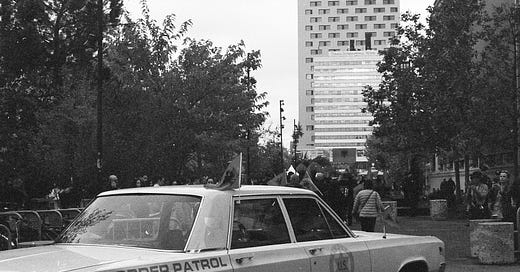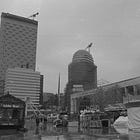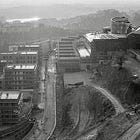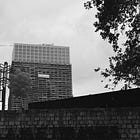The history of the Special Structure against Corruption and Organized crime (SPAK) and the National Investigation Bureau (BKH), which is the law enforcement arm of SPAK, is also a history of all the attempts by the Albanian government to bring them under its political control. As an institution that is the product of the Justice Reform, its establishment was delayed many times beyond every conceivable legal deadline. Meanwhile, the government of Prime Minister Edi Rama launched a series of initiatives to establish a quasi-BKH institution under the name “Force of Law,” which, rather than being directed by an independent judiciary, fell under the control of the Ministry of Interior Affairs.
But once SPAK, BKH, and the Special Court against Corruption and Organized Crime (GjKKO) were finally functional, it became quickly apparent that rather than supporting the anticorruption work of the judiciary, the Ministry of Interior Affairs had worked against it all along. Meanwhile, Parliament responded to the establishment of these independent judiciary bodies by expanding its own immunity, making it more difficult for SPAK to investigate or arrest Members of Parliament.
Ever since the beginning of the Justice Reform, the establishment of an independent arm of the judiciary, free from political interference, was touted as the way to catch the, in the often repeated words of former US Ambassador Donald Lu, “big fish.” And indeed, SPAK has recently embarked on a serious fishing expedition, catching not only a whole cohort of Socialist Party (PS) Ministers, but also former President Ilir Meta, and, despite widespread initial skepticism, the no. 2 of the PS, Mayor of Tirana Erion Veliaj.
The success of SPAK, not only in terms of arrests of corrupt politicians but also convictions at the GjKKO, is not only reflected in the tentative improvement of Albania’s score on the Corruption Perceptions Index and the perception of SPAK as the most trusted public institution in Albania. It is also apparent from the vehemence with which Prime Minister Edi Rama has started to attack SPAK. For the past years, for example in the case of Meta’s arrest, Rama spoke of SPAK as “an independent machine gun,” otherwise having “no comment.” Veliaj himself phrased this policy eloquently in April 2024:
Let me start with the red line of the Socialist Party and Prime Minister Rama: The cases that the new justice opens, against whomever and wherever, at whichever level of executive or administrative responsibilities, are not to be commented upon as regards their legal aspect, but are simply to be entrusted to the organs of justice. Anyone who is involved in these cases has to confront justice by themselves, stripped of any type of defense except the legal defense of their own lawyers.
However, ever since Veliaj’s arrest, Rama has fully crossed this red line. In a recent statement to Reporter, Rama said:
The position that the Socialist Party and Prime Minister have held for five years not to make any comment on any specific case has changed when they took the mayor of the capital from his work to imprison him without trial, while also locking up his wife, a mother of a 6-year-old boy.
In essence we are confronted with a case that creates the reasonable doubt of an investigation off the constitutional rails and an arrest in violation of democratic standards.
Meanwhile, the State Police gave apparent free rein to PS supporters and municipal civil servants to harass and attack magistrates and employees of the GjKKO, which, alarmed, declared that “protestors have surrounded all judges and the administrative staff, and the safety of their life and health was clearly threatened.”
This then raises the question why Prime Minister Rama has suddenly launched this full-on attack on SPAK. There are two possible directions an answer could take. The first of those assumes that Rama is trying to protect Veliaj, either because he is one of his closest political allies, and/or because Veliaj has enough dirt on Rama to take him down with him. In the past, Veliaj indeed has made veiled comments that appear to link his own fate to the Prime Minister’s, for example in the public statement from April 2024 that I cited earlier, when it was revealed that several high-ranking municipal officials were involved in a sprawling corruption affair.
In the statement, Veliaj compared his own proclaimed innocence to the Prime Minister’s, implying the similarity of their plights:
Now there is a question, as brutal as it is banal, that is usually raised by the medieval inquisitors, modern-day security officers and media prosecutors at their television bars, whenever SPAK acts against a certain official: How is it possible that Edi Rama (sic!) didn’t know this, and how could it happen that, even up to his deputy, a person currently sought by justice [sc. Arben Ahmetaj] could do all that nasty shit he’s being accused of without the blessing of the prime minister? […]
How can it be so indisputable that a prime minister – or in my case, a mayor – knows about everything that has nothing at all to do with his legally determined function or with the objective and then 1,001 daily problems of his work?!
Back then, this statement was widely interpreted in the media as a veiled attack on Rama. And if he were smart, Veliaj may have indeed kept enough documentation to incriminate him, considering their lengthy political collaboration. But I would rather like to explore a second line of thought, namely that Rama’s sudden aggressive stance toward SPAK is not motivated by who was captured, but how.
Because the Veliaj–Xoxa dossier is, as also the Prime Minister acknowledged during a recent Instagram live feed, “curious.” It is curious in the sense that, as I have suggested before, the case appears to have been built, at least in its initial phase, on extensive forensic accounting. Rather than from a ready-made criminal act, the investigation departs from a series of coincidences: houses that were acquired just before a tender was won; payments made just after the receipt of a construction permit; wealth declarations that didn’t add up. This then provided enough evidence to justify searches of property and seizure of cell phones and private records, which provided the documentary and circumstantial evidence that eventually led to interrogations and finally arrest warrants. In other words, SPAK has shown the ability to build a comprehensive corruption and money laundering case by pulling on a single thread: a holiday villa in Qerret.
My working hypothesis is that this “off the rails” methodology may have spooked Rama, since it is precisely this type of detailed investigative work that also has the potential to ensnare him. Rama has turned openly against SPAK because he has now started to see it as a realistic threat to his political survival. He is worried because, to speak in the terms of Ambassador Lu, he is the biggest fish.
Based on the methodology followed in the Veliaj–Xoxa dossier, let us try to sketch the speculative outlines of an investigation into the sources of Prime Minister Rama’s wealth – because wealthy he is. SPAK could start with real estate, in particular his compound in Surrel, designed by Belgian architecture company 51N4E, which also won competitions for the TID Tower and together with Anri Sala for the renovation of Skënderbeg Square. As in the Veliaj–Xoxa dossier, one could start by looking at how 51N4E was paid (or not) for the design, how they won their design competitions, and the contractors involved in all these different projects, the procedures and payments around any (re)construction activity.
Then there is travel. Early on in Veliaj’s investigation, SPAK found that he had traveled several times out of the country on private charters accompanied by the contractor who built his house, and there were also records of business trips made that had not been paid for by public money through the regular procurement procedures. In the case of Rama, much more extensive allegations were made recently by former Deputy Prime Minister Arben Ahmetaj, claiming that Rama between 2016 and 2020 made multiple charter flights out of the country paid by businessmen, including trips to a “detox hotel,” Palace Merano in Bolzano. And Ahmetaj has certainly not been the first to denounce the Prime Minister’s many flights on private charters, and cross-checking all of these against his annual wealth declarations and concessions granted by his government would no doubt turn up numerous “coincidences.” Public records from other countries could be useful as well, such as the public US records showing $6,000 spent in Trump’s Washington DC hotel to meet with a corrupt FBI agent (see below). How did Rama travel there? Who paid for this? What may he have gotten in return?
Another angle to the investigation could be Rama’s clothing habits, which are anything if not exclusive. Much has been made in the media of Xoxa’s fashion expenditures, but SPAK may want to consider how a politician, even a prime minister, can afford to consistently dress in Yohji Yamamoto and still pay for groceries. In the same way that SPAK could simply have counted every single Comme de Garçons Play shirt in Veliaj’s wardrobe from his Facebook photo feed, calculating the approximate cost of Rama’s fashion collection based on his media appearances would likely reveal some interesting discrepancies between revenues and expenses.
One of the official acts that Veliaj was able to monetize as a mayor was the granting of building permits. The kickbacks received through Xoxa’s arts nonprofits and companies turned into the centerpiece of the SPAK investigation. As the head of the National Territorial Council (KKT), Rama presides over permits on a much larger scale: skyscrapers and strategic investments. If we remind ourselves of the epithet that Rama received during his time as Mayor of Tirana, “Mr. 10%,” and the scope of the municipal corruption under Veliaj, one can only imagine the magnitude and complexity of such theft on a national level. It is difficult to believe that no one at SPAK, looking at the sums of dark money flowing through the permits directorate at Municipality of Tirana, would consider the massive real estate projects along the Albanian riviera as unworthy of their attention.
Finally, there is the looming implication of Rama in multiple organized crime investigations, which equally fall under the remit of SPAK. Rama’s name has turned up in several investigations involving decrypted messages from Sky ECC, a communications network widely used in the criminal milieu until it was dismantled in 2021, for example involving Albanian election interference by drug trafficking organizations and a Belgian case of money laundering of cocaine traffic proceeds through Albanian real estate.1
A related angle would be to look at Rama’s external advisors and the connections they facilitate. For example, there is the case of Rama’s External Advisor for Security, the Romanian General Florian Coldea, who is currently implicated and wide-ranging corruption affair in his home country.2 And what about former External Advisor and Deputy Minister of Energy, Dorian Duçka, who liaised with Charles McGonigal, a former FBI counterintelligence chief who received $225,000 through a former Albanian intelligence agent that facilitated several meetings of him with Rama in Tirana and Washington DC.3 Duçka was interviewed by SPAK in October 2023, and, remarkably, when the scandal around Coldea broke in the Romania media in June 2024, photos featuring Coldea and Duçka together surfaced as well. And on top of that, according to a Mexican investigation from 2022, Duçka also liaised between the Mexican Sinaloa drug cartel and the Albanian Prime Minister. Looking at all of these leads, one could only say, “what an embarrassment of riches!”
These complex criminal relations are often difficult to untangle and require a professional and well-equipped team of prosecutors and investigators. With the Veliaj–Xoxa dossier, SPAK has proven that it can unravel such relations at least on a national level. And pulling a single thread is all it takes. A single message that wasn’t encrypted, a single phone call that was wiretapped. A single payment that wasn’t made in cash.
Right now there is a real risk that Rama will openly endeavor to undercut the work of SPAK. He has many tools to do so: the parliamentary majority of the PS allows him to rewrite legislation and implement budget cuts, limiting the jurisdiction and capabilities of the special judiciary institutions. He also has nearly full control of national media, allowing him to attack the work of the judiciary through a multitude of public channels. Indeed Rama said as much in a recent Instagram live feed:
For the Justice Reform I claim authorship together with the PS, I think that is much more clear than before, now that also the US has withdrawn from it. […]
SPAK is here and has only one guarantee. […] The only guarantee for the survival and progress of SPAK under the conditions of this total war that is waged by the political swamp headed by the old owl [sc. PD leader Sali Berisha] is the PS led by me.
I asked the EU Delegation in Tirana to respond to Rama’s threats, and they released the following statement:
The specific role of the Special Structure against Corruption and Organised Crime (SPAK) and its independence in investigating, prosecuting and adjudicating high level corruption cases, free from any attempt of political interference and undue pressure, is of key importance for the entrenchment of the rule of law in Albania.
These are of course nice and “firm” words. But right now, with the United States withdrawing from its many foreign aid programs, it will be up to the EU alone to support one of the few real successes of the Justice Reform: the special prosecution and courts. Unless the European Commission and its representatives in Tirana actively step in to protect their investment in the future of Albania and the rule of law – for example by threatening to stop accession negotiations the moment SPAK is touched – there is a real risk that Veliaj will turn out to be the biggest fish they will ever catch.
The Albanian Mechanism is part of Manifesto GREAT WAVE.
Both Albanian leaders of the drug trafficking organization received nine-year sentences on June 28, 2024.
The investigation against Coldea is still ongoing,









